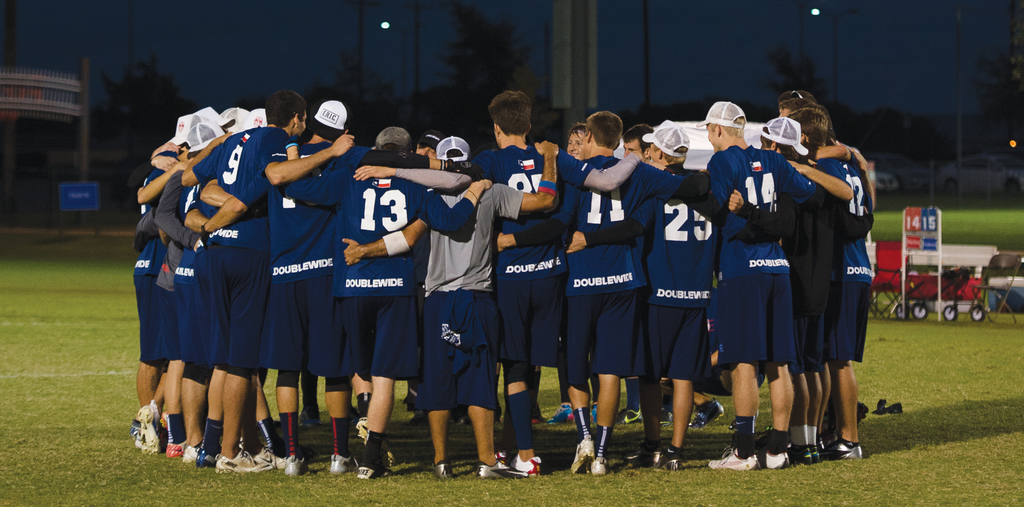Salvaging Spirit During Game Time

"Highly competitive play is encouraged, but never at the expense of mutual respect among competitors, adherence to the agreed upon rules, or the basic joy of play." - usaultimate
Have you ever looked around in the middle of a game and realized that the Spirit of the Game (SOTG) has crashed into a wreckage of aggression? Most of us have been there, and most of us have done nothing about it. But if you’re El Capítan of your equípo, it’s your responsibility - nay your duty - to take charge and turn that Spirit train around. This isn't always an easy endeavor so we’ve come up with a step-by-step guide to help you get that Spirit train back to the station.
1. Call a timeout and assess the damage.
Take a clear-eyed look at the quality of Spirit in your game. Be honest with yourself- if the lack of Spirit originated with you, then you probably aren’t the best person to start the healing process. Look to your co-captain or another respected player to accomplish the rest of this list. You must begin setting the appropriate example by altering your attitude toward the other team.
2. Refocus your team.
Once you're in the huddle, bring everyone’s attention to the problem at hand:
- Layout the problem as you see it. Tell your team that Spirit may have taken a turn for the worse in this game. But it’s one of the things that makes ultimate special, and Spirit can and should be salvaged.
- Don’t shy away from admitting that you personally lost sight of what’s really important in this game. A leader can inspire trust in their followers when they admit wrongdoing.
- Tell your teammates that you expect each of them to make a personal choice to salvage SOTG for the rest of the game. Make it clear that good Spirit benefits both their teammates and their opponents.
3. Speak with the opposing team's captain.
Take a second to leave your huddle and find the captain of the other team. If the Spirit has been poor thus far in the game, the opposing captain probably feels the same way you do, and they will be interested in repairing both teams’ attitudes.
Take responsibility for what your team has done to contribute to the poor Spirit, listen to the other perspective, and attempt to find a common ground from which you can move forward for the rest of the game. If you’re unable to come to an understanding or the other side isn’t willing to talk, do your best to come up with a solution to the parts of the problem you can control.
4. Double down on team cooperation.
Now head back in your team’s huddle, summarize the outcome of the conversation with the other captain, and relay the plan for the rest of the game. Put it in no uncertain terms: unspirited play will have consequences for the players responsible and for the team as a whole.
5. Be the spirit you wish to see in the world.
Commit to your solution, and set an example for both teams. If there are other players on your team that are highly respected, consider speaking with them separately about cooperating with your example.
Stay positive and constructive with your own team, and use your attitude on the field to show your respect for your opponent. When a sketchy call comes up, trust that they’re not trying to cheat you, but rather making legitimate calls based on their own perspective, just like you.
After the game is over, we encourage teams to engage with their opponents in a spirit game. Spirit games and weird team traditions are meaningful and fun ways to diffuse negative attitudes and bolster fun times, but you have to be genuine about it. Check out our master list of spirit games for some ideas!
Bonus: An international perspective on improving SOTG.
The Spirit Circle
Spirit Circles can be great to clear the air after a highly competitive or contentious game. They aren’t meant to be used in the middle of play, but they can be hugely helpful after the game is over.
To learn more, check out this excellent talk by Seattle Riot at the World Flying Disc Association’s Spirit of the Game Conference in 2015.
Spirit Timeouts
While little-known in the US, Spirit Timeouts have a solid tradition in international play. They are just what they sound like: if a team’s captain believes that either team is failing to follow the Spirit of the Game, she or he may call a Spirit Timeout to talk it through and resolve the situation. The Spirit Timeout is even written into the World Flying Disc Federation rules.
A great example of a Spirit Timeout done right occurred during the World Under-23 Open Final between the US and Canada in 2015. The US National Team was putting up aggressive dangerous bids, and at first, Canada responded in a similarly hostile manner. When the situation was clearly out of hand, the US Spirit Captain called a Spirit Timeout, and all participants came together to talk it out. After the timeout, the players adjusted and finished the game on positive and respectful terms. SOTG for the win!
